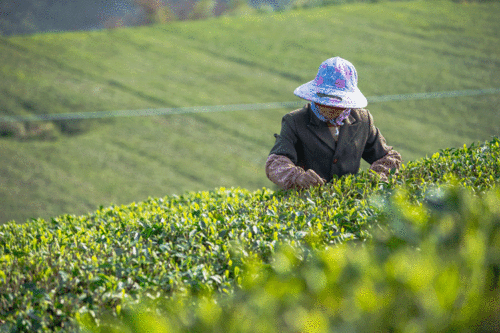China's Contributions to Global Poverty Reduction
 |
| A farmer picks white tea in Fuding, Ningde city, Fujian province. The local government has stepped up efforts to lift people out of poverty. [China Daily] |
Since the implementation of China's reform and opening-up policy, the country has made some astonishing contributions to the world. Among the many achievements, China's efforts in reducing poverty are highly remarkable. In fact, in only four decades, China has lifted around 800 million people out of poverty, accounting for more than 70 percent of the global poverty reduction rate. According to United Nations data, China is the major country to accomplish the UN Millennium Development Goals and its progress has contributed to reducing the extreme poverty rate in East Asia from 61 percent in 1990 to 4 percent in 2015.
Such efforts have been possible thanks to Chinese leaders' visionary ideas to bring about economic reforms and strategies specifically aimed at reducing poverty and improving people's lives. Since the 18th National Congress of the Communist Party of China, poverty reduction has occupied a leading role in the country's overall national plan. Furthermore, by the end of 2015, Chinese President Xi Jinping proposed that the remaining poor population would have guaranteed access to food, clothing, compulsory education, basic medical care and housing by the end of 2020. Furthermore, it is also expected that by 2020, the per capita net income of farmers in poor areas will be higher than the national average while providing basic public services in poor areas will also be closer to the national average.
China has not just achieved the biggest poverty reduction project in the entire history of humankind. The country has also been working to make sure that the remaining poor population can be equipped with the necessary tools to get out of poverty themselves through a combination of national policies implemented at a local level. The targeted poverty alleviation strategy put forward by Chinese President Xi Jinping, in fact, specifically targets poor households and villages by involving all different levels of local governments, from provinces to cities, from counties to villages. Furthermore, targeted poverty alleviation allows a better definition of poverty reduction projects and funds allocation, so that clear goals are defined in advance and achieved through the close cooperation between local governments and rural people themselves.
In a seminar on eliminating poverty in 2017, President Xi Jinping emphasized the importance of encouraging people to work, get employed and "lift themselves out of poverty". At the same time, President Xi affirmed that Party committees and governments in severely impoverished areas must make poverty elimination their top priority during the 13th Five-Year Plan period (2016-2020) as well as the most important project for improving people's well-being. The elimination of poverty in China before 2020 would be another milestone for China's reform and opening-up and would make China the first country in the world to achieve Goal 1 of the UN 2030 Agenda for sustainable development, which is ending "poverty in all its forms". By 2020, China will achieve this goal 10 years ahead of the deadline established by the UN 2030 Agenda.
China's openness toward innovation and its critical efforts in bringing people out of poverty is a result of the four decades of reform and opening-up. China isn't merely on the right path toward achieving the other goals as defined by the UN 2030 Agenda. The country's outstanding achievements in poverty reduction, facilitated by its reform and opening-up, can become a reference for other developing countries as well. In this matter, dialogue among countries, especially developing countries, has become crucial for capacity building and knowledge sharing. China's development model and its massive success in bringing so many people out of poverty can also be further studied by the developed world.
China is on the right path toward achieving the Chinese Dream of national rejuvenation. And being a highly successful developing country, China has also a huge responsibility, which is to share its experiences and cooperate with other countries through already established frameworks. These include the South-South Cooperation and China's brilliant Belt and Road Initiative as well as other institutional channels of dialogue, such as the Asian Infrastructure Investment Bank. Concerning poverty alleviation, the International Poverty Reduction Center in China -- established in 2005 by the Chinese government, the United Nations Development Programme and other international organizations -- is certainly a highly beneficial platform for "knowledge sharing, information exchange and international collaboration in the areas of poverty reduction and development".
As an international scholar based in China, I believe that there are plenty of achievements since China's reform and opening-up. However, I am persuaded that China's poverty reduction efforts need to be further applauded and told to the world because such change is unique and represents one of China's greatest contributions to humanity as a whole in this new era of technological development. At this year's Boao Forum for Asia, President Xi Jinping said that "only through win-win cooperation can we make big and sustainable achievements that are beneficial to all". I believe that win-win cooperation and sustainable achievements stand at the core of China's reform and opening-up policy. The country's successful story of poverty reduction would have never been possible without the spirit of openness and inclusion that is typical of Chinese cultural values.
The author is a graduate of China Studies and International Relations at Peking University and the London School of Economics. Currently, he is working in the fields of development and public policies.
(Source: China Daily)
Please understand that womenofchina.cn,a non-profit, information-communication website, cannot reach every writer before using articles and images. For copyright issues, please contact us by emailing: website@womenofchina.cn. The articles published and opinions expressed on this website represent the opinions of writers and are not necessarily shared by womenofchina.cn.


 京公网安备 11010102004314号
京公网安备 11010102004314号